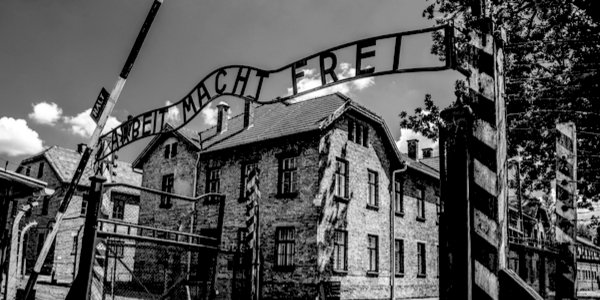JANUARY 27th was Holocaust Remembrance Day, a commemoration that political leaders are now careful to observe. Indeed, this year, Prime Minister Sir Keir Starmer, who has pledged that every child will learn about the Holocaust, even visited Auschwitz-Birkenau with his Jewish spouse.
The day was designated as such only in 2005, seemingly a late development in the recognition of that which only much later became widely known as ‘the Holocaust’ or ‘the Shoah’, but in the decades after the War, this great crime grew in the public consciousness, coming to represent the nadir of human evil. And yet, it seems that in January 2025 – 80 years since the liberation of Auschwitz – some politicians are emulating the Roman god Janus, who famously faced both ways.
For although it now appears to be obligatory for politicians to show their sympathy for the Jewish people by observing the Holocaust, they seem less ready to acknowledge the biggest anti-Jewish threat: Islamist terrorism. It may be fashionable to practise Holocaust observance, but it is also increasingly fashionable for politicians to show ‘awareness’ of the Palestinian people who, their supporters allege, are suffering genocide at the hands of a vengeful Israel. Holocaust observance can provide Janus-like politicians with the opportunity to please both parties.
Starmer has faced a clash of political priorities regarding Israel – between placating the pro-Palestinian campaign while not appearing anti-Jewish – but at least he explicitly mentioned the Jewishness of Holocaust victims. In contrast, as Norman Fenton, the son of a Holocaust survivor, notes, some of this year’s memorialisation did not go so far as to acknowledge this basic fact.
For example, Deputy PM Angela Rayner failed to mention Jews in her HMD statement, which read: ‘Tonight, I’m lighting a candle to remember all those who were murdered just for being who they were, and to stand against prejudice and hatred today. Never again.’ Ms Rayner could be seen as highlighting the dilemma of the modern left-liberal progressive politician with regard to the Holocaust: how to show sympathy for the Jewish people while not looking unsympathetic to the plight of Palestinians in Gaza, whose situation has been aggressively appropriated by far-left activists in a campaign of marches, demonstrations and even vandalism.
The targets of such attacks included a portrait of British politician Lord Balfour, slashed and sprayed with red paint, in protest at his historic role in the creation of the modern State of Israel. But these are far different times, and under woke ideology, which divides humanity into ‘oppressors’ and ‘oppressed’, into ‘majorities’ and ‘minorities’, the State of Israel may be criticised or even attacked, even though the latter are far more numerous, and according to the same ideology, attacking Israel means oppressing an oppressed minority.
Increasingly, however, it seems that while it is perfectly acceptable to criticise the failings and the allegedly genocidal actions of Israel, we must not acknowledge the fact that the Palestinian people are ‘represented’ by a terror group with genocidal intentions against Israel – that the ‘poor victims’ of the Israel Defence Forces are actually hostages of Hamas.
It might be thought that if Western politicians were threatened by the same malign forces, they would be less inclined to lecture Israel on the need for dialogue with those intent only on kidnapping and murdering them. But Western nations have been threatened by terror and still live under that threat, although perhaps this explains politicians’ reluctance to ‘call out’ the threat: perhaps they hope that by not being too vocal about Islamist terrorism, their nations may be spared even worse outrages.
Whatever the reason for their selective timidity, it does seem as if the Jewish state, far from being seen as a positive response to the Holocaust, is fast becoming the scapegoat of the nations as the Jewish people were once the scapegoat of the Nazis. However, to the far-left mindset, ‘the Jews are the new Nazis’, so attacking them is only fair.
Holocaust memorial is now, apparently, ‘political’, and as one Jewish commentator remarks, ‘I’ve lost count of the times that I’ve been told Jews need to stop selfishly hogging the Holocaust’, recalling that Howard Jacobson asked ‘When will Jews be forgiven the Holocaust?’.
It is beyond ironic that the woke ideology ‘coat-tails’ on the Holocaust, explaining why silencing any discussion of certain issues is now regarded as a priority: it is believed that to allow free speech on these issues is to risk ‘another Holocaust’. According to this thinking, the aggressive anti-Israel rhetoric of the far left, which might indeed lead to violence, is perfectly acceptable, but a clumsy gesture of greeting by billionaire Elon Musk is greeted with horror as a Nazi salute.
Describing Israel’s defensive actions as ‘genocide’ is treated as fair comment, while expressing the scientifically-backed view that a man cannot become a woman and a woman cannot become a man justifies censorship and ‘cancellation’, even of celebrities.
The governing classes, desperate to avoid coming to the obvious conclusion, have frantically attempted to give the impression that ‘far right’ and Islamist terrorism pose equally serious threats, with the implication that ‘right wing’ views shade into fascism and would, if allowed free expression, inevitably lead to ‘another’ Holocaust – but with Jews as perpetrators, not victims.
Newly re-elected President Trump, who has already declared war against woke, seems to be our only hope of overthrowing this 21st century tyranny. Failing that, we face a bleak future, mainly because we have lost our past, or rather it has been stolen from us.
Note: Ann Farmer has a Master’s degree in Jewish-Christian Relations.











